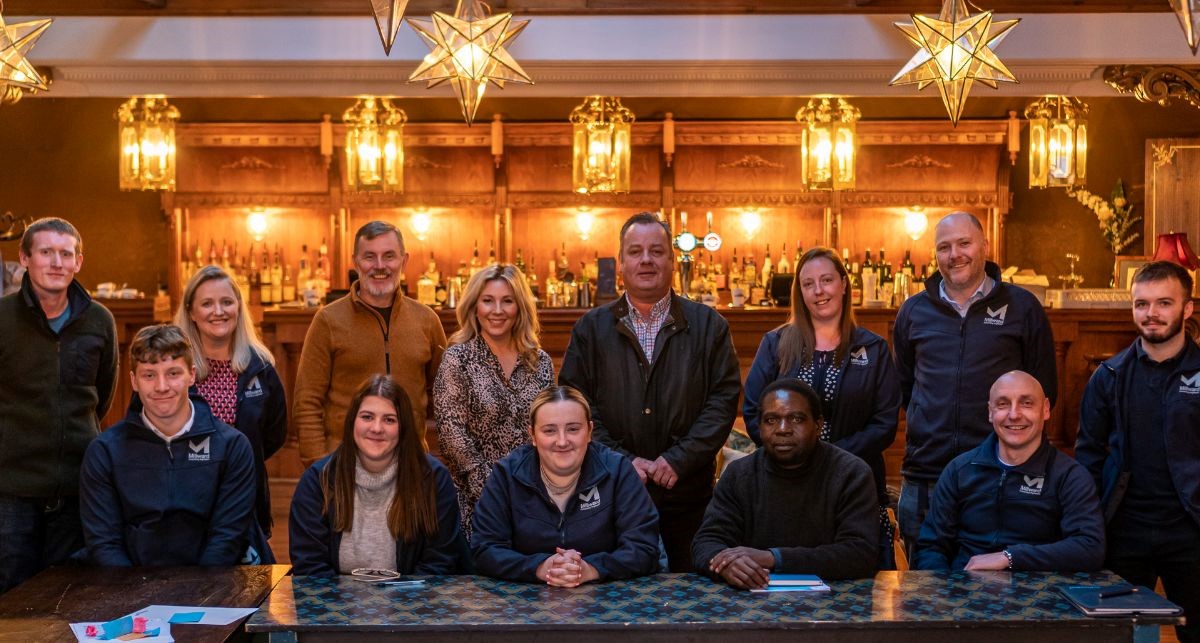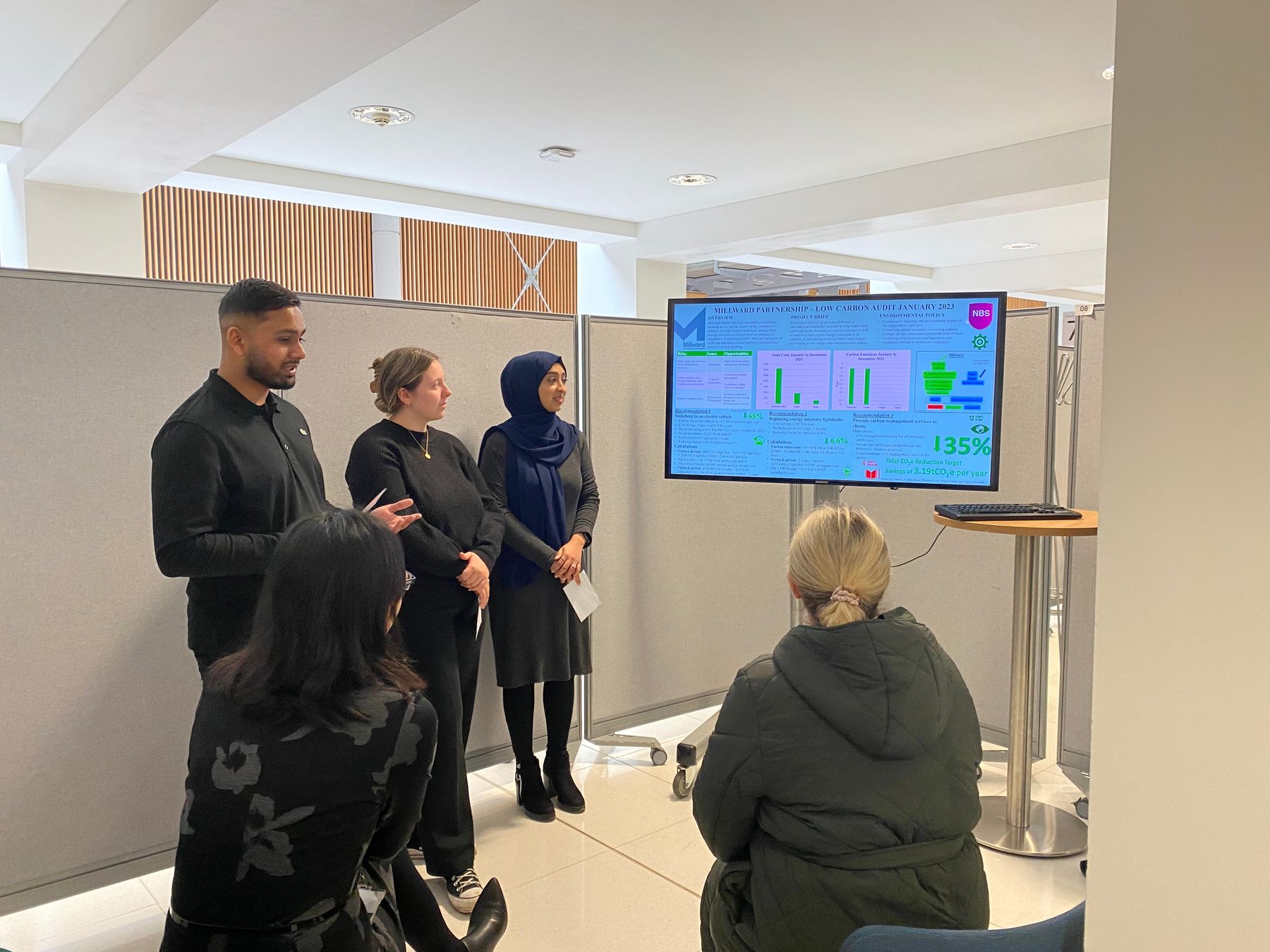Sustainability in Enterprise Case Study - Millward
Recommendations from Nottingham Business School students help engineering firm Millward to reach their carbon targets
Millward are an integrated engineering consultancy working across multiple sectors of the construction industry - solving complex challenges and adding value through innovative solutions, from pre-planning to completion. Established in 1993, the Nottingham-based company specialise in civil, structural, environmental and geotechnical engineering for highways, infrastructure, survey work and reporting.

Background
Millward have been working closely with a team of final year students from Nottingham Business School (NBS) to explore ways to reduce their carbon footprint. Drawn from a broad range of undergraduate courses including business, accounting and finance, economics, marketing, and management, the students are studying a carbon management and sustainability related module called ‘Sustainability in Enterprise Project’. The module gives students a unique opportunity to provide carbon management consultancy to business organisations including reviewing/developing environmental policy, establishing the business case for carbon management, calculating carbon footprint and offering practical recommendations to reduce carbon emissions. Student consultants are supported by academics with expertise in sustainability and carbon management including Dr Muhammad Mazhar (SiE Project Strand Lead), Dr Shaun Gordon (SiE Module Leader), Dr Ramez Kian and Al Dharmasasmita (Module Tutors) and Helen Taylor (NBS Sustainability Consultancy Projects Coordinator).
We spoke to Joanne Ord, Finance and Administration Manager at Millward to find out how the company have benefited from the support on offer.
“Before the student consultancy, we were already doing things like recycling, including sending our crisp packets to a project in Hastings which turns them into blankets for homeless people. We had also swapped our PC towers for laptops, which consume a lot less energy, and were planning to switch to more energy-efficient LED lightbulbs. But beyond that, we were struggling to find the next significant step and had drawn a bit of a blank.”
“I thought it would be good to get some help from NTU’s student consultants as they’ve been studying sustainability for much longer than I have and really know their stuff. As a company, we wanted to find out if we were on the right track with sustainability and get some practical help to reduce our energy use and carbon impact. It was really beneficial to see where we were.
The student sustainability consultants found that Millward’s two biggest carbon generators came from their electricity and transport use. Key recommendations included switching to an electric company vehicle, which could cut Millward’s travel-related carbon emissions by 65%, and replacing energy intensive lightbulbs, which could lower their electricity-related carbon emissions by 6.6%. The students also identified significant cost savings. Switching to an electric vehicle could save the company £5,000 a year in fuel costs, while replacing energy intensive lightbulbs could save £576 a year. Alongside this, the students also outlined how Millward could provide carbon management services to their clients, which could reduce their carbon impact by 35%, while increasing their competitiveness as an engineering consultancy.

Implementation of recommendations
Joanne continued: “The student consultants were all really insightful, they asked great questions and came back with some fantastic solutions. It was spot on in terms of what we were looking for.
“They checked our lighting and recommended the best way for us to switch to LED which gave us the confidence to go ahead with our lighting plans. Our LED lightbulbs have only been fully installed since January, but we’ve already seen a 20% saving in our monthly electricity bills. On top of that, we’ve also had a Carbon Grant from NTU, which has refunded 40% of the upfront cost, making switching even more affordable.
“The students also recommended moving our window decals so we can make more use of natural light. We’re currently having our windows upgraded from single to double glazing with support from Nottingham City Council and are implementing the students’ suggestions as part of this project, which should be completed in the next few weeks.
“Next, we’re exploring how we can switch to a more sustainable company vehicle. At the moment, we’re leaning towards hybrid rather than all-electric, because our engineers often drive long distances to remote construction sites beyond the current charging range of fully electric vehicles.
“We’re also looking at how we can develop a carbon management plan for the client services we deliver, as part of working towards ISO 140001 certification for environmental management. The students recommended we provide all our staff with carbon management training, so we can embed our newly-found knowledge into our wider business practices. We’ve already made a start. For example, we’re reducing the number of emails we send and are sharing our approach with our clients.
“We’ve also switched to a lower weight 80gsm recycled paper and are using local suppliers instead of ordering items like office supplies from abroad. All the small changes can really add up and by sharing what we’re doing to reduce our carbon impact, we can hopefully inspire our clients to do the same.
The impact
“We’ve set ourselves a target to reduce our carbon footprint by 15% this year, and by a further 15% by the end of 2024. The support we’ve had from NTU’s Sustainability in Enterprise programme has helped us to embed sustainability across the business and get the whole staff team on board with lowering our emissions. People were really quite shocked by how much carbon comes from specific things like emails and are now more willing to accept some changes.
“We really appreciate the help and it’s been great to be able to reach out to NTU when we have questions. We’re new to sustainability so we have a lot of questions, but it’s never been too much trouble for anyone, including our student consultants.”

Students taking part in the Low Carbon Conference
The student experience
BA (Hons) Business Management and Accounting and Finance student, Tahmid Kamali, took part in the module. He told us how the carbon management project with Millward helped to enhance his personal and professional development.
“It was a good experience and great to be able to apply all the knowledge gained throughout the module to a real-life scenario. The client was very happy with the recommendations we put forward and was confident that these could be implemented within their organisation. One of the main benefits was that we got to really understand the impacts of climate change and learning how to calculate carbon outputs helped us to see how we can help SME’s like Milward make significant changes to their carbon footprint through small scale changes.
“I particularly enjoyed the poster presentation. It was very engaging and really helped us to showcase our findings. Being knowledgeable on this allowed us to present with confidence and really demonstrate that we met the client brief. It was clear to see that the Milward representative was engaged with our presentation and enjoyed listening to what we had to say.
“It was a huge learning curve to see the impact we can all have to reduce the effects of climate change. Having learnt about the Sustainable Development Goals, it was a lot easier to see how easily these goals can be implemented into a business through effective strategies and processes. I feel like I can apply this knowledge into wider aspects of my own life or to other businesses to help them change towards a more sustainable future”.
The Sustainability in Enterprise Project was launched in 2021 at NBS and is part of the European Regional Development Fund (ERDF) project running at NTU. This consultancy project module provides final year undergraduate business school students with a deeper understanding of sustainability and carbon management issues that organisations face, and the opportunity to act as a consultant to local SMEs.
By acting as sustainability consultants, students gain invaluable business acumen including the ability to read and interpret client briefs, manage a project, identify issues, diagnose problems, and present findings and recommendations. Experiential learning and the opportunity to work on live organisational challenges is a core part of the NBS experience and provides students with a skillset highly sought after by employers and the confidence to thrive in the professional world.
Personalisation and Experiential Learning
Personalisation is key at NTU. Find out how you can personalise your degree at NBS, for an experience that's right for you.